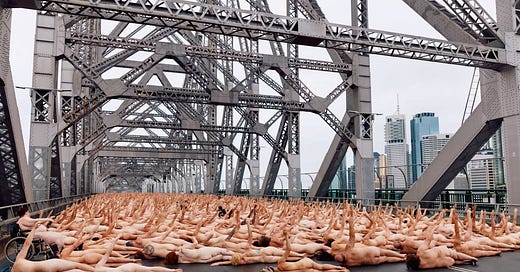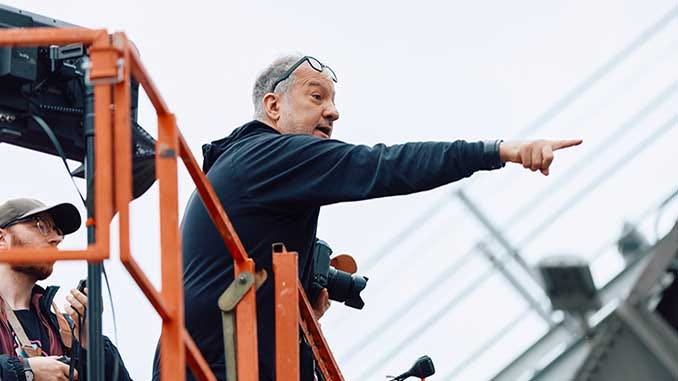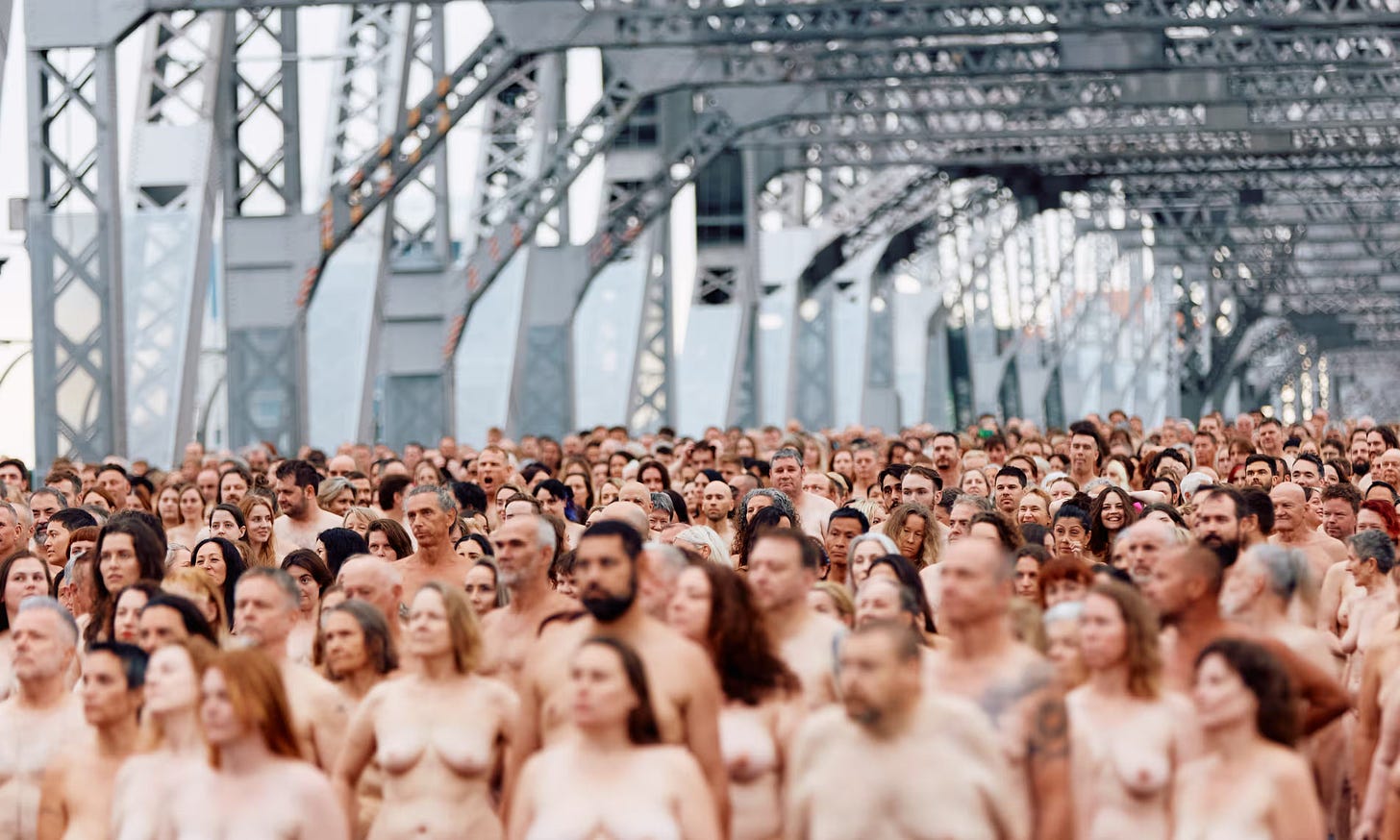Who Told You That You Were Naked?
On participating in a mass nude photoshoot for Spencer Tunick's 'Rising Tide'.
I don’t like being naked. I’m not someone who sleeps naked, skinny dips, or undresses in front of their friends. I am insecure about function, rather than form. I sweat, I have body hair, I menstruate and ovulate - heck, I’m still kind of lactating two years on since weaning. Being naked feels messy, so I save it for messy activities with people who are too busy revelling in their own naked messiness to care very much about mine: children, lovers, and mothers of very young children.
It is fitting, I suppose, that it was my wayward mother’s group (dubbed ‘The Coven’) who invited me to participate in Spencer Tunick’s ‘Rising Tide’ installation, as part of Melt Festival. The provocation was striking: thousands of strangers would gather naked to be photographed by the New York artist on Brisbane landmarks.
One mother, whom we shall call Alpha, proposed we all do it as an act of defiant bodily acceptance. She had struggled to love her own changing body since having a child four years ago. Beta signed up in an act of terrified rebellion, despite raised eyebrows from her partner. Gamma grew up in a hippy commune and felt like it would be a nostalgic experience. I thought the early morning start sounded horrible, and delayed responding to the group chat.
Something got to me, though. The thrill of art-making whispered and tickled and itched. The mother friends I do have are rare finds in the childcare and education systems. They are often neurodivergent feminists; artists and dreamers who aren’t scared of their own rage and yearning. It has been hard to meet mothers who are familiar with having their own needs, let alone voicing them, who don’t pretend to be satisfied and in control all the time. Honesty is so rare in parental small talk, and messiness and hunger are only exposed when there is intimate trust. So when this group of women – all hungry and messy in their own way - decided to get naked for art, I realised I wanted to sign up too.
The morning of the shoot, we rose at 1:50am. It was raining. Beta and I couldn’t find a park in Kangaroo Point, so we parked illegally, and walked two kilometres in a drizzle to get to the Story Bridge. Alpha arrived with an old friend we had not yet met - Delta. Gamma called to say she’d had a fight with her husband, hadn’t slept, and wouldn’t be able to make it. We all met eyes, worried but relieved she could tell us.
We walked across the bridge, deserted of cars, rain-soaked metal glistening under street lights. Everyone’s clothes jumped out to me as facades that would soon come away. We didn’t know what was going to happen on the bridge, or how soon it would take place, so as we entered the large crowd we quietly weaved around people, moving away from any men we found intimidating, and slotted ourselves into an area where we were surrounded by gentle bodies and faces, just in case this was where we would end up stripping off.
An elegant woman in her sixties stood nearby, holding a motorcycle helmet, beaming nervously. She shivered at us as she made small talk. Where we were, at least, not many people spoke outside of the cliques they’d come with. It felt solemn and anticipatory, with small bursts of chaos from bolder participants. I write this fully aware of the intensity it evokes, but I mean it gently – the wait was laced with a dark humour, as if we were lining up for consensual mass execution. It wasn’t lost on me that we were standing on a bridge plastered with the Lifeline phone number, pleading with distressed members of the public not to jump from the landmark, as so many had done before.
I wondered why we were all there, who was drunk or on drugs, and who was there to leer or strut or simply be a part of something. The energy wasn’t sexual, nor was it performative or even celebratory. We had just all decided to be a bit brave and a bit stupid, together. We had arrived around 3am, and at 4:30am Spencer spoke to us through an amplified loudspeaker, informing us of what would take place. There were three set-ups, one on the Story Bridge, another on the River Walk, and another in a laneway. He told us to exit the bridge on the Fortitude Valley side to find lettered signs – here we would undress and leave our belongings in little piles. We traipsed down into the Valley, holding our collective breath.
All in all, it was a mammoth organisational effort from the Melt Festival team. There were blocked roads, portaloos, and volunteers at every turn. Five thousand five hundred people turned up, though it didn’t feel like that to those of us amid it. There was a weird intimacy.
We were at the back of the crowd, and as we wandered off the bridge, we saw people getting walking back naked. ALREADY. OH GOD. IT HAS BEGUN. It kicked off a panicked group-think response, and we all suddenly went to rip our clothes off, before the loudspeaker sounded again:
“I am VERY sorry, but we did NOT tell you to take off your clothes yet. We will not shoot until the sun is rising in 45 minutes.”
The crowd began to giggle then, a grumbling chuckle of ‘alright then, fuck you’. The ice broke in a way that fascinatingly bonded us to one another, in solidarity against the artist – a predictable othering, since he and his team would remain dressed the entire time. It wasn’t that we resented him, or intended to resist him, we just knew the power was skewed. We were his cattle for those few hours, existing as a herd he controlled en-masse, not as individuals… but though we were ‘just bodies’ there were far more of us than there were of him and his team, and our united sassiness helped to form a communal voice in our vulnerability. This voice became clearer as the morning went on.
We huddled in our cliques, making strangled conversation with one another (Where would you like to travel to next? Where is the strangest place you’ve ever gotten naked?) as the sun rose. I caught a glimpse of a young man eating a cornetto wearing nothing but a lambswool jacket – his version of re-clothed. Then, finally, the word came: undress.
It happened quickly, simply – without drama. Clothes stuffed in bags, left on the road. Once a few people got naked, it was contagious, and thrilling, like penguins diving off a cliff. Bare bodies were suddenly standing tall and proud as far as the eye could see, everyone looking pointedly at one another’s faces, only, and every face grinning. We could almost feel the collective exhale. Shoulders dropped. The nervous energy was replaced with a childlike playfulness. This is it! This isn’t so bad!
One of the things I have considered a lot since Rising Tide, is how safe people became in their nakedness. Without adornment, we were genuinely equal. We didn’t search the diverse smorgasbord of bodies for signifiers of class, code, threat, occupation, age or status. We didn’t need to - we were all just skin. It wasn’t that we were the same, either. Our bodies were vastly different in shape and colour and softness and size and ability – things that would usually classify us socially, but suddenly did not. Tattoos were on display in the full range of absurdly cool to badly-ageing glory, and hair became the safest focus when finding one’s friends. We stared at a lot of bottoms (walking forward along the bridge and river walk), and marvelled at how beautiful and genderless they were. The cliques immediately dissolved, and we talked to strangers like they were old friends. We giggled, cracked jokes, offered gentle compliments, or commiserations over the wet ground. We were all equally vulnerable and equally beautiful.
Couples tended to hold hands, but everyone else sustained a deeply asexual posture. When I accidentally brushed the hand of a much older male, he quickly made a joke indicating his queerness, to protect me and put me at ease. Many middle-aged cis-het men were there with their female partners.
We walked along the bridge in the gloomy morning and marvelled at the wildness of being on the river as a naked flock. If I recall correctly, I got so excited I started to dance, stopping just short of some high kicks. It was apocalyptic – without a car or clothed person in sight, it felt like we were the only people in the world, and the whole world was somehow reset back to the Garden of Eden. There was no shame. Not a shadow of it, from anyone. No-one told us we were naked.
Spencer had firm instructions: no smiling in the photographs, equal spacing, and we were informed via loudspeaker which pose to move into next. When he asked us to lie flat on our backs on the cold, wet road of the bridge, five thousand people groaned in unison, and quipped about the gravel up their arses. Staring up at the sky, people began to call out more, to offer jokes, to find one another in the strangeness of it. NO SMILING, said Spencer through the loudspeaker, but it was too late. We were already giggling, in love with ourselves. It was magical, in its privacy. Freezing, uncomfortable and sacred.
But then, of course, we moved to the second location, and that began to change.
We got dressed again (to some extent) under the lettered signs, a hot cauldron of bodies, and shuffled down to the Howard Smith Wharves like five thousand people doing a walk of shame from a one night stand’s apartment. I wore nothing but a trench coat and held my shoes in my hand. The sun was well and truly up, now, and people had begun coming out onto their balconies in curiosity. Down in the Veuve Clicquot champagne garden, we averted our eyes from people’s identifiable clothed-ness, and muttered in our friendship groups. I saw a girl I once matched with on Hinge, said an awkward hello to her and her friends, then kicked myself for making it weird. Delta had an old male acquaintance come up to have a catch up, much to her mortification. Everyone was clothed at this point, but somehow we were naked in a different kind of way.
We undressed again for the second shoot, but the sun’s UV was getting spicy and the magic was wearing off. By now, we had all been awake for well over four hours, and trudged quite a few kilometres. ‘WALK TO THE VERY END OF THE RIVER WALK’, said Spencer, and so we edged onto the floating pathway, suddenly feeling very exposed to the general public.
CityCats went past, with early-rising commuters filming us. Men on jet skis took photos. Families came out onto their river-facing apartment balconies – either with iPhones in tow, or arms crossed in disappointment. Some people let their children come out to watch, to which I had a strange resistance. To counter the voyeurs, the naked mass heckled, waved and whooped at onlookers. One man came out of his apartment starkers, and received a resounding cheer a few thousand people strong. The art still felt sacred, but our exposure did not. The difference, I realised, was that we weren’t exhibitionists, protestors, or performers. Our nudity was not supposed to intentionally confront the general public, at least as far as I knew – we were naked for the artist, for ourselves, and one another. We were nude, but we were still people worthy of privacy and respect, yet in our vast number (and the rising sun) that was no longer observed.
We did another shoot, which I honestly found so exhausting that I can’t even write about it without feeling a whole-body ache. We shuffled as a clump - still naked – back off the River Walk, through Howard Smith Wharves and into a steep laneway, but by this time there were runners stopping to take footage, families going to church, and a grandma with pursed lips staring down from her apartment in a dressing gown. Someone had a medical incident, and a medic sprinted up with a wheelchair. I kept trying to find shade, knowing I would burn in the sun. When we were eventually informed our six hour shift of nudity was done, and we could head to the ‘after-party’, we scrambled and limped back to our clothes as if we were released from jail. I couldn’t wait to get dressed… until I did. And then I missed the nudity, desperately.
This might sound like an exaggeration, but I truly feel that the second our clothes came back, our shame did too. The anonymous energy vanished when we could be differentiated from one another. People who were having banter stopped, now separated by the systems they wore on their bodies. Proud shoulders hunched, revealing a social anxiety that they were not wearing in the naked mass. Warmth went a little colder, quieter – the cliques had higher walls than ever.
People were still kind, but they were no longer united. When one person chose to wear sunglasses on the nude commute from shot to shot, it felt like a betrayal - as if one adornment edged that person out from all the rest of us blank slates. Getting dressed was like seeing a blind date suddenly in the daylight. Except our clothes were the baring element – they demarcated us into the different ‘worlds’ we imagined we belonged within, and reintroduced an exposing hierarchy. Those who had giggled side by side in child’s pose, buttholes in one another’s faces, now knew they would never cross the boundary lines their costumes decreed. And that’s all clothes are, I now believe. Just costumes, dress-ups of who we’d like to be - not accurate representations of who we actually are.
The mothers and I couldn’t bear the thought of lining up for coffees at the after-party. We wandered up onto the bridge – now transformed and teeming with cars - and walked back to the south side. We were quiet, sore. Someone spoke about their marriage, and sighed. We shared our plans for the rest of the day, and they nodded in sympathy when I mentioned I had to attend a children’s birthday party at a play centre. The sun felt too hot, too bright, too rude. The clothes felt claustrophobic. People I’d been next to whilst naked walked past me. I bowed my head away, and didn’t say anything.
The meaning of a naked body comes from how it is wielded – and not all nudity is created equal, of course. There is a titillation or confrontation to it at times, or potency in its protest or play. It can be sexual or familial or medical, or in our case – entirely neutral. Safe and unsafe.
In this experience, I have come to understand that everyone is radically softened when neutrally naked. That our bodies are safe things. And everyone - everyone - is astoundingly beautiful without clothes on. Especially mothers.






